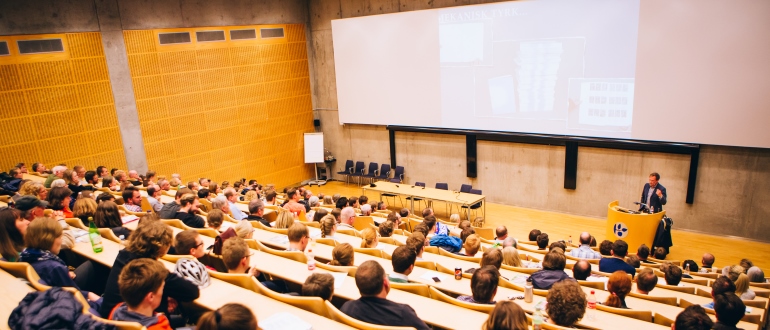| Date: | 13 June 2019 |
| Time and place | 10-14 in room O96 - SDU, Campus Odense |
| Registration | Was before June 3 |
| ECTS | 0,75 |
Social Robotics and Everyday Interaction
Morana Alač
Voice is toward other voices, it is listened to, responded to through voice or other actions, and it talks back. We live a moment when voices more frequently emanate from things across our environments, as our current relationship with consumer electronics is said to be at a paradigmatic shift. The internet-of-things and associated digital assistants—voice-controlled artificial intelligence software embedded within a variety of commercial products—are to make our homes smart, connecting every object in the spaces we inhabit to everything and everyone. Social roboticists are acknowledging this move as a march of social robots from the laboratory into the big wide world, as these gadgets are to communicate with us in a friendly and personal manner. Even if they are only simplified versions of social robots, these commercial products maintain the rhetoric of their predecessors; designers conceive of their sociality and effects of presence in relation to the intentional mind of an individual. In the case of digital assistants, this mind manifests via voice.
The challenge for this class will be twofold. We will reflect on approaches to these kinds of digital technologies, and will challenge ourselves not to reduce their voices to the inner of an individual, while we recognize their power and specificity. We will consider the two facets concomitantly by discussing discursive framings and everyday practice in social robotics; collecting interactional material; and performing re-enactments as exercises for noticing. In doing so, we will engage ideas in ethnomethodology, distributed cognition and semiotics. Our conceptual focus will be on the problem of the body and environment, but we will aim to engage it specifically as it plays out in our interactions with digital assistants and the everything-internet.
Enrolled students are invited to read the following texts before attending the class:
ALAč, Morana, MOVELLAN, Javier & Fumihide TANAKA
(2011) "When a Robot is Social: Enacting a Social Robot through Spatial Arrangements and Multimodal Semiotic Engagement in Robotics Practice," Social Studies of Science, 41(6): 893-926.
ALAč, Morana
(2009) “Moving Android: On Social Robots and Body-in-Interaction”, Social Studies of Science, 39(4): 491-528.
ALAč, Morana
(2016): “Social Robots: Things or Agents?” AI & Society, 31(4), 519-535.
ALAč, Morana
(2016) “Zeigt auf den Roboter und schüttelt dessen Hand: Intimität als situativ gebundene interaktionale Unterstützung von Humanoidtechnologien,” Zeitschrift für Medienwissenschaft, 15, 41-71.
English translation: “Points to and Shakes the Robot’s Hand: Intimacy as Situated Interactional Maintenance of Humanoid Technology”
Other suggested readings:
BREAZEAL, Cynthia
2002 Preface and Chapters 1-4 IN Designing Sociable Robots, Cambridge, MA: MIT Press.
RISKIN, Jessica
2003 “The Defecating Duck, Or, The Ambiguous Origins of Artificial Life”, Critical Inquiry, 29(4): 599-633.
CASTANEDA, Claudia & Lucy SUCHMAN
(2014) "Robot Visions," Social Studies of Science, 44(3): 315-341.
NASS, Clifford & Jonathan Steuer
(1993) “Voices, Boxes, and Sources of Messages: Computers and Social Actors,” Human Communication Research, 19(4): 504-527.
JEREMIJENKO, Natalie
2005 “If Things Can Talk, What Do They Say? If We Can Talk to Things, WhatDo We Say?”, Electronic Book Review.
WHALEN, Jack & Erik VINKUYZEN
2001 "Expert Systems in (Inter)Action: Diagnosing Machine Problems over the Telephone", IN Paul Luff, Jon Hindmarsh and Christian Heath (eds.) Workplace Studies: Recovering Work Practice and Information System Design, Cambridge, UK: Cambridge UP, pp. 92-140.
________________________________________________________________
Our events are open free of charge to PhD students from our own program, and from all other programs provided they also offer tuition free of charge to our students. ’Soon-to-be’ Phd students may also attend with permission from the event instructors and the Program Director, whom you should first contact if this applies to you (Dennis Day: dennis.day@sdu.dk). We are also very happy if members of staff wish to attend, particularly PhD supervisors, and will accommodate them in lieu of space. We ask all who attend an event to register. You’ll find the online registration form on the same page as the event description.
http://www.sdu.dk/Forskning/PhD/Phd_skoler/Phd_humaniora/alle_kurser#IGS
